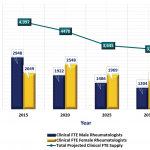A recent review of progress on the five-year guideline development plan indicates the program has met its benchmarks, even while taking on new projects. The Quality of Care Committee and the Guidelines Subcommittee have renewed their efforts to produce guidelines that are useful and relevant to practicing rheumatology providers.
Provision of high-value care is an increasingly important aspect of defining quality care. Although we see the value we provide to patients and the healthcare systems in which we work, documenting and quantifying this value is not easy. The Rheumatology Informatics System for Effectiveness (RISE) registry was developed as a certified Quality Care Data Registry to provide rheumatology practices the ability to document their provision of quality care. The fact that 100% of practices that submitted their Merit-Based Incentive Payment System (MIPS) data via RISE qualified as exceptional performers in their first year of reporting indicates that rheumatologists are, in fact, providing high-quality care and that the investment in building the registry has provided significant value to practicing rheumatologists.
RISE has become the largest source of real-world, clinical data on rheumatology care in the world and will be an increasingly important and useful source for understanding and documenting quality and high value care in the rheumatic diseases. The registry is also a highly visible example of the way in which the ACR and its members are driving innovation and progress in healthcare.
From the very beginning, innovation & rheumatology have gone hand in hand.
Rheumatology Past, Present, Future
From the very beginning, innovation and rheumatology have gone hand in hand. Basic research discoveries in immunology attracted clinicians and physician scientists to define an entirely new specialty. Further stimulating the specialty is the ongoing research in rheumatic and musculoskeletal diseases that have led to life-changing therapies and many new insights into etiology, diagnosis and treatment of some of the most intractable diseases.
Innovation is also apparent in the way we learn and teach, and examples of novel and cutting-edge educational methods by rheumatology educators abound. Ongoing inquiry and learning are intrinsic aspects of the practice of rheumatology.
These features of our specialty have not gone unnoticed by our youngest learners. The progress in our field has been accompanied by a surge in interest in rheumatology training. Securing rheumatology fellowship training through the Match has recently become nearly as competitive as the most popular internal medicine specialties, and training programs are seeing a surge of interest, increased numbers of applications and more highly qualified applicants than ever.



